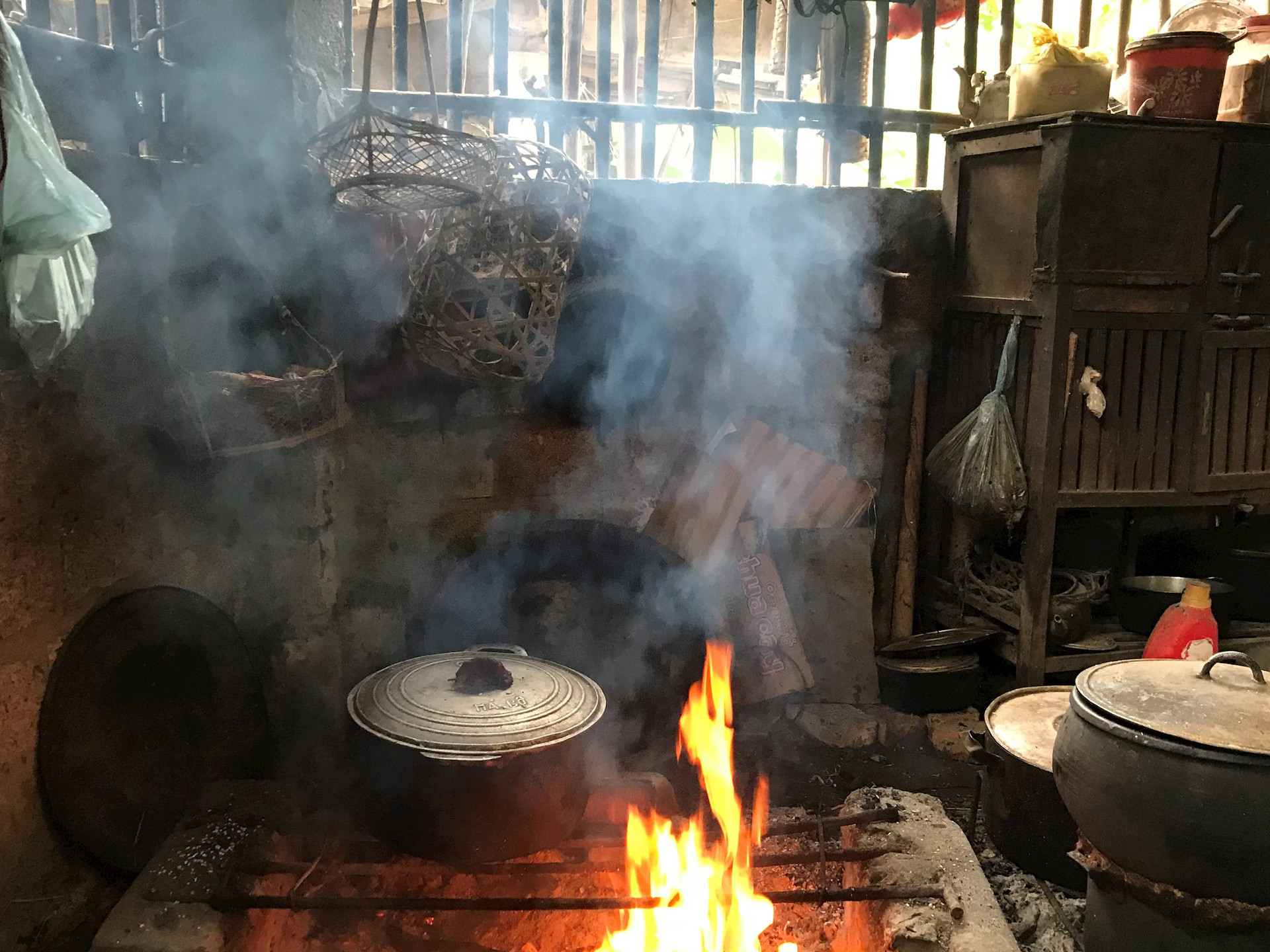
That's understandable, because nowadays every house has gas or electric stoves, gleaming pots and pans; hardly anyone uses straw or wood stoves, with soot and grime clinging to the surfaces like we did back then. Our generation was born during a time of hardship, and the toil and struggle are still deeply etched in our memories. Perhaps that's why the fragrant smell of straw smoke from those sooty kitchens of yesteryear lingers, refusing to fade from our senses. Just like this afternoon, the bluish smoke rising from a small garden by the roadside stirs a longing in my heart, compelling me to immediately inhale deeply that pungent aroma. The delicate wisps of blue smoke weaving through the trees transport me back to that small village of yesteryear, where the measure of a family's well-being was measured by the size of the haystack in the yard or the rice storage bin in the room.
When I was very young, I was familiar with kitchen smoke, or more precisely, straw smoke, because firewood was very scarce back then; only wealthy families could afford to buy it.
Rice, soup, drinking water, and even pig feed are all cooked using straw. Sometimes, if the drinking water isn't boiled properly, it has a smoky, musty smell, a corner of the white rice turns yellow, and bits of ash fly into the pot—but that's perfectly normal, and nobody is bothered by it. For farmers, having straw or rice stalks to burn is a blessing, as they also need to save some for their buffaloes to eat to give them strength to pull the plow.
When harvest season arrived, all of us children knew how to dry the straw, and in the evenings we would gather it up before the sun set. After the harvest, there was always a towering haystack in the yard, providing us with an ideal hiding place for hide-and-seek. In my imagination, it looked exactly like a giant mushroom, complete with a roof to shelter us from the rain and sun, and a cozy nest for our chicks.
It took great skill to be chosen to climb up and stack the straw; a beautiful straw stack was round and well-proportioned. Those who gathered the straw for fuel also needed to know how to do it properly, pulling evenly around the stack to prevent it from tilting and easily falling over. The roof of the straw stack sometimes felt like a warm shelter, and we would often snuggle inside to play games like selling things or hide-and-seek. Nothing was more delightful than finding a nest of rosy eggs from a free-range hen nestled perfectly round in the soft, velvety base of that straw stack.
On rainy days, the straw outside would get wet, making it difficult to start a fire, so the kitchen was always full of smoke. The smoke, trapped by the rain, couldn't rise high, lingering above the tiled roof and swirling around, dyeing the small kitchen a thick, bluish hue. Sometimes, the smoke was so dense I could reach out and scoop it up.
Ignoring the stinging, reddened eyes we'd had from being unjustly scolded, we happily cupped our hands to trap the smoke, then ran quickly out to the yard, delightedly watching the thin wisps of smoke slip through our fingers, swirling and gradually dissipating into the air. We knew this familiar nursery rhyme about smoke by heart since childhood—I think I knew it even before I could read—and every time we saw the bluish smoke from the straw in the small kitchen, we'd shout, believing that doing so would make the smoke disappear and stop our eyes from stinging.
Clatter, smoke
Go over there and have rice with fish.
Come over here and smash a rock on my head…
The smoke from the kitchen stove is especially memorable for me when the weather starts to get cold, the space is dry and no longer as hot as in the summer. The smoke is white, thin, fragrant, and light. It becomes even more fragrant when the flickering flames crackle the fallen dry leaves in my yard. In the winter kitchen, I often sit by the stove, watching the mesmerizing dance of the flames under the pot while waiting for something to cook or some root vegetable to be buried in the hot coals.
It could be potatoes, corn, cassava, a knife, a piece of sugarcane, or anything else that's put into the fire to roast. The cold makes the fire brighter and more vibrant. Straw fires burn very brightly, but they have little ember and burn out quickly, so whatever you're cooking, you have to sit there and watch over it; you can't run off to play.
While waiting for the food to cook, one of my never-ending pleasures was picking up the puffed rice grains that popped when leftover rice grains in the straw crackled, to eat as a quick snack to ease my impatience. These puffed grains appeared unexpectedly like white flowers; if you didn't quickly use a stick to scoop them out, they could be burned black by the fire.
In the bitter cold of winter, dry straw would also give us children another treasure: tightly woven bundles of straw. The smoke from these bundles would keep the fire burning brightly amidst the seemingly extinguished embers. And our smoke-stained hands would be less numb thanks to the delicate smoke within those magical straw bundles.
Along with the smoke, the smell of simmering rice, the aroma of dishes cooking in pots, the smell of things grilling over charcoal, or the smell of fat, greasy grasshoppers when the season arrived—these are the eternal scents that will never fade from my memory. I also often remember the guava tree I used to climb on afternoons when the kitchen smoke began to seep through the tiled roof, searching for tiny, out-of-season ripe fruits left on the branches. Sitting in the tree, guessing what my mother was cooking in the kitchen, watching the thin, delicate smoke curling softly in the air, and imagining it as the flowing dress of a fairy about to fly to heaven.
There, I could let my thoughts wander endlessly with the smoke drifting in the evening breeze until it merged with the smoky clouds high in the sky. I always sat like that, waiting for my mother to cook dinner, munching on guavas and "scouting" to see which houses in the neighborhood hadn't lit their stoves yet—a fact revealed to me by the wisps of smoke rising from each kitchen roof. While watching the smoke, my eyes were always fixed on the road to the next village, where my "fascist" older sister would be coming home from school. If I saw that familiar figure, I would immediately get down from my chair and start sweeping the house or washing the dishes.
Only when everything was finished could I comfortably climb the guava tree branch to count the plumes of smoke rising from my neighbor's kitchen, and try to guess whose house was simmering fermented fish paste, braising fish, cooking pickled vegetables soup, or grilling salty dried fish over hot coals that afternoon, filling the air with an irresistible aroma.
Occasionally, I think that smoke makes grilled food taste better. Many dishes now grilled in air fryers or expensive ovens lack that distinctive smoky aroma. But in today's crowded urban environment, kitchen smoke is no longer suitable for bright, modern spaces. In fact, smoke even triggers air raid sirens, reminding people of a serious concern.
Even so, this afternoon, amidst the lingering blue smoke beside a quiet garden, I suddenly felt a deep longing for a warm, old kitchen filled with the fragrant smoke of burning straw. I saw the scent of smoke still clinging to my clothes, my hair, and my hands; I saw myself in a poor neighborhood, counting the wisps of smoke drifting over the tiled roofs every evening. Counting the smoke to know if the owners of each small kitchen had returned home to cook dinner, because seeing the smoke meant seeing the warmth of each home. Without the smoke, how sad those poor kitchens would be.
Source: https://daidoanket.vn/van-vuong-khoi-bep-10287967.html

































































![[Image] Ho Chi Minh City simultaneously commences construction and breaks ground on 4 key projects.](/_next/image?url=https%3A%2F%2Fvphoto.vietnam.vn%2Fthumb%2F1200x675%2Fvietnam%2Fresource%2FIMAGE%2F2026%2F01%2F15%2F1768472922847_image.jpeg&w=3840&q=75)







































Comment (0)